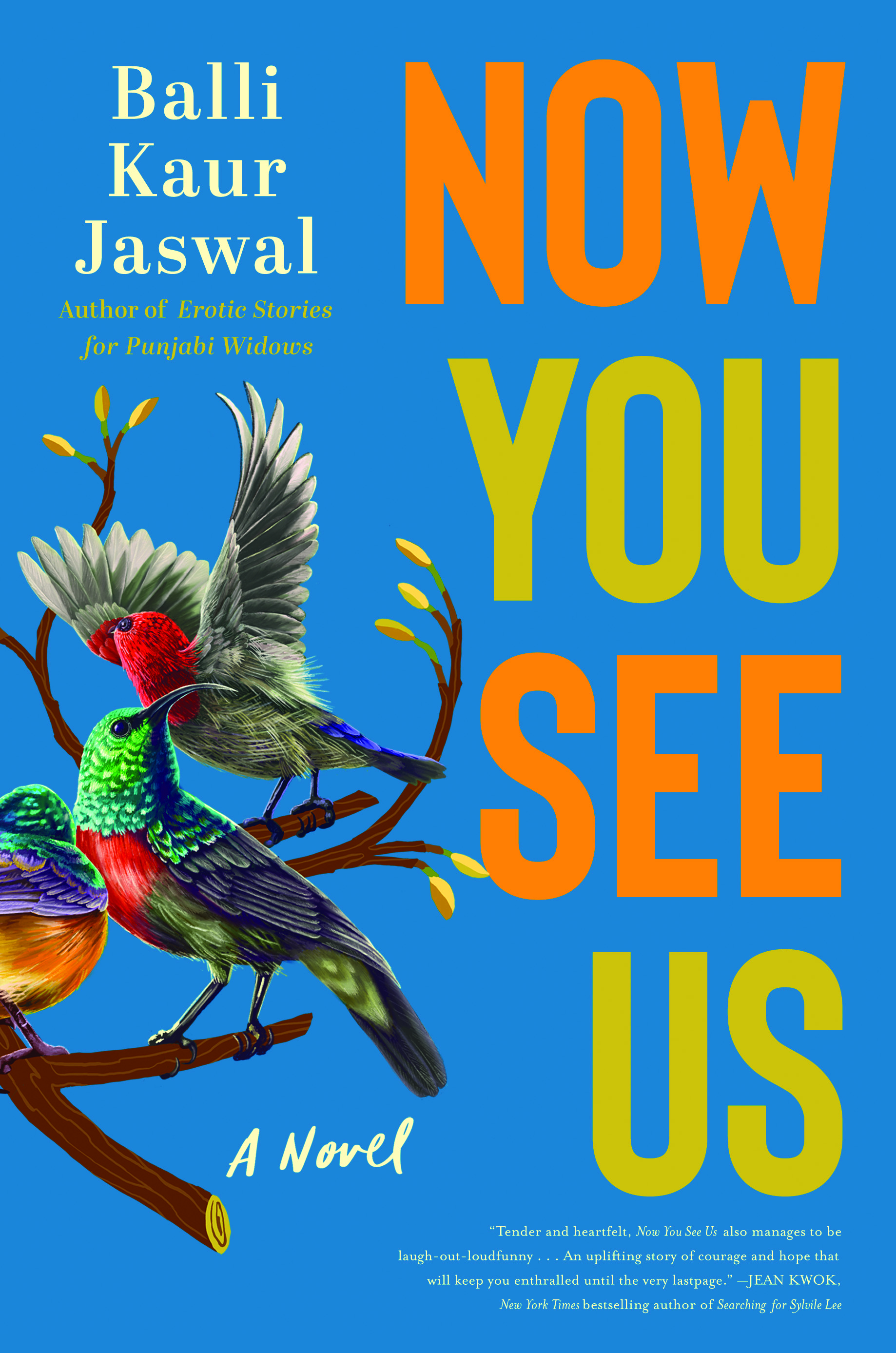'Now You See Us' Is Our March Book Club Pick
Read an excerpt from Balli Kaur Jaswal's latest novel, here, then dive in with us throughout the month.


Welcome to #ReadWithMC—Marie Claire's virtual book club. It's nice to have you! In March, we're reading Balli Kaur Jaswal's Now You See Us, a sharp thriller about three domestic workers who band together to solve the murder of one of their own. Read an excerpt from the book below, then find out how to participate. (You really don't have to leave your couch!)
Cora knows that the first rule of being a maid is “Be invisible”—strive for the translucency of ghostly soup stains on kopitiam tabletops. Sidle from room to room and pretend to know nothing that has not been directly revealed to you. But she cannot hide her surprise at Mrs. Fann’s words. The Lees have never had a maid? How did they manage the cooking, the cleaning? Between the living room, the dining area, and the five rooms upstairs, just washing all the curtains would take an entire day. Who swept the dried leaves from that huge back porch or brought in the laundry at the first distant rumble of thunder? She can’t imagine Ma’am Elizabeth, with all her poise and grace, on her knees scrubbing the floors. Yet the house was clean when Cora arrived, if a little bit bare in the pantry.
Mrs. Fann’s eyes narrow when she catches Cora paying attention. She nudges Ma’am Elizabeth and says something in Mandarin.
Ma’am Elizabeth replies in English. “Establishing trust goes both ways, don’t you think, Poh Choo?”
Her answer brings a flush to Mrs. Fann’s cheeks. She takes a small step away from Ma’am Elizabeth and her tone becomes icy. “I hope that’s true. The older maids tend to be better anyway, hmm? Age slows them down, makes them more sensible maybe. There’s my girl, by the way.”
Cora follows the direction of Mrs. Fann’s nod, and immediately she sees the problem. Dressed in a skin-hugging pink tank top and tiny white denim shorts that reveal slender legs, this girl does not look like she apologizes for anything. Her large rhinestone-studded hoop earrings wink as she tosses her hair from side to side. If Mrs. Fann’s husband has a wandering eye, she probably has reason to worry.
A long time ago, Cora overheard her former employer Mrs. Motwani advising a neighbour to avoid hiring pretty maids. “Have you seen mine? Hardly a threat,” she said without bothering to keep her voice down, as if she thought Cora were deaf as well as plain. With sleek long hair and heavily lined eyes, Mrs. Fann’s maid is very striking, and she appears to know it. The purse that swings from a narrow strap on her shoulder matches the cherry-red gloss of her lipstick and fingernails. She is holding two Cold Storage plastic bags limply at her side, as if she wants to forget them.
Get exclusive access to fashion and beauty trends, hot-off-the-press celebrity news, and more.
Ma’am Elizabeth and Cora walk with Mrs. Fann towards the supermarket, and as Mrs. Fann examines the contents of the bags, Cora gives the girl an understanding smile. The girl gazes back coolly.
“Donita, I said no breasts!” Mrs. Fann’s voice booms.
Yes, we get the point, Cora is tempted to say. How many more faults will Mrs. Fann find with her maid, who obviously does not understand the unwritten rules about modesty? Then she sees Mrs. Fann holding up a packet of chicken fillets. “I cannot cook with these, do you understand? I need the bones in order to make stock for the soup,” she cries. Her voice echoes off the walls. “You see what I mean?” she asks Ma’am Elizabeth. “Every little thing, she gets wrong. They’re supposed to make our lives easier, but I’m doing more work correcting her mistakes.”
“I’m sure it’s like that in the early days,” Ma’am Elizabeth says. “Give her some time to settle in.” She offers Donita a reassuring smile but the girl’s sullen expression doesn’t change.
“Aiyah, Elizabeth, you are very patient,” Mrs. Fann says, then she looks around conspiratorially before continuing. “I think Belinda Quek’s standards are dropping. Even her office staff are subpar. I finally got the receptionist to tell me where she is and she said, ‘Myanmar recruitment trip.’ She used to have Merry Maids, now they are Budget Maids. To tell the truth, I was tempted to go elsewhere to hire better help, but how would that look? What if it got back to her?”
As she launches into another litany of complaints about maid agencies, Cora introduces herself to Donita in Tagalog. “I’m Corazon Bautista, from Manila.”
“I’m Donita.” Her eyes brighten at the chance to say her name. Cora feels a pang—Raymond was around the same age. If he were alive, he would be like that young man in the sandals who is lingering nearby, suffering through sample after sample of terrible pizza-flavour combinations in a bid to get a closer look at Donita.
Cora glances at Mrs. Fann. “Is she always like this?”
“So far,” Donita says. “She doesn’t give proper instructions just so she can scold me for not reading her mind.” She holds up a hand, trembling from pasma. “She made me hand-wash all the laundry last night because I asked her how to use the washing machine. She said, ‘Maybe after this, you will make the effort to learn.’”
Donita speaks Tagalog with a strong Ilocano accent. “You’re from the north?” Cora asks.
Donita nods, and there is a flash of longing in her eyes at the mention of home. Cora recognizes this too; the first months are the hardest. She wants to tell Donita that it will get better, but she knows what a long road it can be with employers like Mrs. Fann.
“Just a word of advice,” Cora says. “If you cover up a bit more, she might give you an easier time.”
Donita’s expression hardens again, and with a defiant upwards tilt of her chin, she says, “This is who I am. If she doesn’t like it, that’s her problem.”
Donita’s expression hardens again, and with a defiant upwards tilt of her chin, she says, 'This is who I am. If she doesn’t like it, that’s her problem.'
Her response twists something in Cora’s gut. Maybe Donita is too young and idealistic to understand that nobody cares who she is here. Cora flashes back to her younger self, crimping her hair for the passport photograph, thinking surely the authorities would see her as somebody worthy of respect. Surely the family in Serangoon Gardens wouldn’t make Cora continue sleeping in a tin shed outside when they had two spare bedrooms. Surely the Motwani kids would stop shouting “You’re stupider than the maid” to each other as an insult. Surely Ma’am Roberta’s husband, who was always misplacing things, would not accuse Cora of sweeping his parking coupon into the bin. As he picked up the ashtray and reared back his hand, time slowed down to accommodate her denial for one last time—Surely this is not happening to me—before it landed with a blinding crack on the bridge of her nose.
Of course she says none of this, and soon Donita is turning her back as Mrs. Fann hustles her into the supermarket to return the other grocery items that she got wrong.
Ma’am Elizabeth smiles and waves. She and Cora walk in the opposite direction, towards the lift to the basement, where Ma’am Elizabeth has parked her car. Cora has to hurry to keep up with Ma’am Elizabeth, who seems eager to get away. As the neon signage of Cold Storage recedes, Cora doesn’t remind Ma’am Elizabeth that they still need to buy groceries. She’s just glad to leave Mrs. Fann and Donita behind.
Now You See Us. Copyright © 2023 by Balli Kaur Jaswal. All rights reserved. Printed in the United States of America. No part of this book may be used or reproduced in any manner whatsoever without written permission except in the case of brief quotations embodied in critical articles and reviews. For information, address HarperCollins Publishers, 195 Broadway, New York, NY 10007.

Brooke Knappenberger is the Associate Commerce Editor at Marie Claire, where she specializes in crafting shopping stories—from sales content to buying guides that span every vertical on the site. She also oversees holiday coverage with an emphasis on gifting guides as well as Power Pick, our monthly column on the items that power the lives of MC’s editors. She also tackled shopping content as Marie Claire's Editorial Fellow prior to her role as Associate Commerce Editor.
She has over three years of experience writing on fashion, beauty, and entertainment and her work has appeared on Looper, NickiSwift, The Sun US, and Vox Magazine of Columbia, Missouri. Brooke obtained her Bachelor's Degree in Journalism from the University of Missouri’s School of Journalism with an emphasis on Magazine Editing and has a minor in Textile and Apparel Management.
